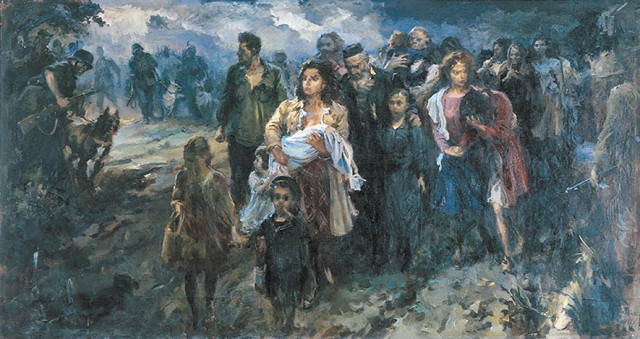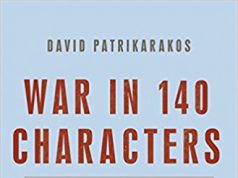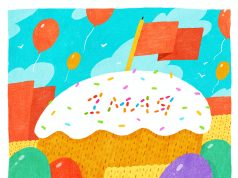This poem appears in English for the first time, translated by Myroslav Shkandrij from the Ukrainian original. Mykola Bazhan, “Debora: Z knyhy umanskykh spohadiv,” Vitchyzna 8 (1968): 1-6.
In memory of Deborah Feinshtein
The field has a covering of dust.
There is spurred rye on the path. Burdock.
Blocs of silent, burned ruins,
The angry thickets of destruction.
Neither walls. Nor houses. Nor graves.
Fields of sorrow. Decay.
Crumbling piles of brick,
The crooked teeth of metal,
And my streams of recollection
Tightly embrace the ashes.
Give me your hand. Give a hand.
We will walk over the burned ruins together
In illumination, in torture, in suffering,
In a wave of anxiety pierced by flame.
Give me your hand, phantom,
Give me your thin hand
On the burned ruins of Uman.
Here you are, standing by me,
Gazing at the path you took.
You have not changed at all
After all these forty-eight years.
Give me your hand. Through you
I see hills and ravines –
And my mother, and your rebbe
Come to us from above,
And you, like they, are transparent —
An unsteady, delicate shadow,
Shot here Deborah,
Gazing into the distance.
Give me your hand. Give me a hand, dead one!
Give me your living hand –
You reached out to us with it,
Falling onto the grass,
Gasping in silence,
Dying in the ravine.
I take your hand,
Your sacred fingers,
And together we walk again
On the ancient highway, trodden for centuries,
And again I read on your pale lips
The slow verses of old poems.
Thoughts with long arms, those ruthless
Excavators of burial mounds,
Run quickly through the years,
Over the trampled continent.
On a funeral bier they carry
An enormously heavy burden.
Come out, Deborah, my phantom,
Onto the path that is not phantasmic or vain.
Stumbling in the ditches,
Tangled in the clods of earth,
Your bleeding legs scratched
By the hard prickles
Run past
The smoky wasteland,
And invisible clay walls,
And destroyed households,
And defiled ash-heaps,
And dirt, and piles of waste metal,
And visions of synagogues,
And unforgettable hovels,
And past the old church,
With icons in silver dress,
And past the church yard,
Where by the well used by the haidamakas,
Sunken into the mouldy, sticky clay,
Still smoulder the fragments and brittle
Bones, pock-marked like a flute,
Of Gonta’s two children.
Past the flames of the haidamaka uprisings,
Past the spears covered in blood,
Stuck into the square by the cloister,
So that people pierced, convulsed, killed,
Would roar from there through the whole town.
Oh, Basilian cloister!
Self-important, silent walls
Above the hubbub of ancient public squares,
Above the lamentation of recent ruins.
Enter its stillness
Mad carriers of the clamouring dead!
Place by the white chapel vault
Your black bier, your remains.
And then let the flames engulf the decay,
Let a miracle happen – and the light strike,
And a recollection, like Lazarus, having overturned the bier,
Will rise above the years, the walls, the clouds.
Deborah! Be the first to enter my recollections –
The sounds of your steps can still be heard there,
The knocking of your wooden shoes,
The enduring echoing of your piano,
When you spread your thin hands
To masterfully touch the elastic cord.
You play and celebrate, dominate and praise
Boldness, pursuit, energy, rebelliousness.
And the music flies high,
Searching for unknown octaves on the keys …
This is how it was. In an old monastery,
In the white walls of the Roman Catholic church,
Where the cross still hung
And audacious swallows made their nests,
Carpenters built a stage,
Fitting the fragrant boards inch to inch,
And with painted curtain rags
Divided the monastery’s hall.
The travelling actors entered,
Les Kurbas created his studio –
And the tired, severe voice of Gonta,
Pushkin’s bright octets,
Oedipus’s alarmed choruses,
And Macbeth, marked by the apparition of wailing witches,
Continued to echo here every evening
And the First Cavalry applauded them.
And before the grey-blue twilight fell,
When Kurbas the master stayed behind
With a group of ragged youths, with us,
To work on bustling mimes,
On the efforts of rough pantomimes,
Revues repeated endlessly –
Then, Deborah, you tried
To help us with your play.
And Kurbas glanced at you kindly.
Throwing back a lock of hair,
He said “bravo!” as though in passing,
“Who is your teacher? You can play, girl.”
You reddened, rose quickly,
Both overjoyed and saddened,
Unhappy and at the same time aglow and beautiful,
Having early tasted the bitterness of devotion.
Who taught you? To this day I remember
A thin figure, beard, pence-nez,
A yarmolka on thinning hair,
A face yellowed, faded and mournful,
And those chords, rigorous, hundred-voiced,
When the right-hand touched the keys –
He lived in the singing world of ancient alarms,
Your father, the synagogue’s cantor.
One immemorial, unremitting theme
Sang in him everywhere and always.
It was singular, common, inseparable –
The harmonic weave of the harmonies of the Baal-Shem
And the dreamy psalms of Skovoroda,
To extol faith in the human that was hidden
In every note, as in the world’s every drop.
To you, Deborah, your father gave this world —
The melodies and songs of both his peoples,
Of those composed by the Levite in the tabernacle,
And those sung by the blind kobzar in the steppe.
He sang Kol-Nidre and afterwards
Cossack laments entered our souls –
Two rivers flowed together, two worlds united,
And you were in both.
Your sorrowful father taught you
Harmony. He taught, as best he could,
Both mournful tones of the synagogue
And quiet songs about flying snows
Falling on the white breast of the dead
With a trembling, parting sigh.
In this way secretly your father taught you
The essence of beauty: thirst and grief.
He was not talkative, the old Jew.
The poor man taught his daughter
To search for strength in music, to hide in the darkness of one’s eyes
The fear of life and isolation.
The souls of these quiet, reserved people
Carefully concealed the storm’s abyss within,
But it revealed itself in music,
Tearing from the depths all its sunken treasures.
At the time I could not grasp the reasons
For their loneliness, pain and secrets.
The mind of an immature boy
Could not see what they concealed,
Could not penetrate those depths of the human heart
Where lie dead layers of fury and calm.
I wanted to understand, but I did not hear
About your terrible story, Deborah, until later …
He walked heavily, carefully placing his feet
On the cobbles covered in broken glass and feathers
And pointed in all directions the machine gun
Clasped in his muscular arms.
In the square he appeared angry, red-eyed:
“Where are the petitioners? Where the ransom? Where the Jews?
How long do I have to wait? How long?!
Grab at least one and bring him!”
The orderly ran to smash the nearest door.
Meanwhile in the market place all the lines
Had been inspected by the angrily wheezing Stetsiura,
A wrestler and heavy-weight champion.
A year ago his stocky figure
With unnaturally flexed bicepts
Looked out from a poster in this same market place.
Let the enemy now observe his
Even larger muscles,
And his chieftain status.
However, the ambitious chieftain
Cannot stand this emptiness and silence:
“Rule! Rage!” Alcohol rouses his brain.
“Dance, foreigners! To the public square!
Smash the doors! Pass me the cord,
Hang the rope around the old man’s neck.
In vain he hid from us his Rachele or Roza
Behind a cupboard in the corner.
Has fear confused you? Can’t you stand?
Throw her …
A blow. Father! A cry. A violent jerk.
How the darkness howls! How unbearably nauseating it is!
A repulsive pain cut inside like a nail.
No death. Or life. No way to heal
The roaring pestilence in one’s womb, heart, dreams.
Blue body has turned into slippery meat,
Flesh – into something disgusting, wild fear – into shame.
You became mute, stupidly, numbly
Looking into your own bottomless night.
Father, too, turned silent. He inexpertly to act,
Avoided looking people in the face,
Never crossed a neighbour’s threshold,
And did not light a candle in the candle holder,
And did not visit the synagogue.
Like a death noose, a cry gripped his throat –
Where to find the capacity for song and hope? …
Days went by like this. The year twenty arrived
In storms and iron, in the move of powerful armies,
And through Uman flowed lines
In the forceful march of Budionny’s divisions.
Every evening Kurbas’s theatre lit for them
The fire of Shevchenko’s prophetic visions
So that the hearts of soldiers would burn in anger,
As though by the embers of bivouac bonfires.
Kurbas felt with his thirsty-curious heart
How time rushes, and calls, and disappears,
Embraced by the impulse of victory.
He heard everything, he also knew everything about you,
About you and your father, and your suffering
He perceived as his own, and he was shaken
By this pain without limit and this cry without sound,
And reached out a sensitive and careful hand
To hearts swooning in silence.
When and where your father met
Kurbas, neither you nor I know,
But your father’s amazing decision
Filled you with limitless wonder.
He returned one evening,
Sat in silence and suddenly said: “Let us play.”
He pulled the bench up to the piano,
Took something out of dusty pile of notes
And a chord of weakened strings resounded
And the quiet of the hovels was broken.
Father said: “I was approached
By the main one from that Kyiv group.
He asked me after long introductions
For you to be his pianist.
Whether you will take up music again
I do not know, so I promised nothing,
But I can no longer stand
Your useless, silent dying.
I would agree. Would you agree? …”
And you came.
Under the roof of the former church
Flitted swallows,
While reflections, azure and green,
Like November, fell to the floor from the walls,
Splashed in flashes on the golden stage.
The hall smelled
Of autumn, and sawdust, and straw,
And young, warm, moist bodies.
The worn-out piano
That could barely keep pace
With the quickly racing scales.
And these young men and women
Were so filled
With their own creativity, sweet and intoxicating,
That their own bodies
Could resonate
In an many-voiced
Joyful disturbance.
Could surrend to music,
To its ruthless power,
Could be moved by the rhythms,
Awakened in language –
To this
Almost aching,
Penetrating pleasure
These hearts were ready to surrender.
This is how a young man’s body is cut open
By one total spasm,
The dazzling shriek of love.
O young hearts,
Uplifted, enraptured, pensive,
You determined seekers
Of the goal, beauty and truth –
In this hungry and yellowed Uman,
Smashed by bullets,
But even if poor and disheveled
With such a yearning for joy!
Students, agronomists, blacksmiths,
Demobilized soldiers
And medical nurses,
Schoolboys without whiskers, young women-teachers,
Agile, talkative as birds.
You played for them.
From under pale fingers
Abruptly splashed and ran
The bright watery
Bells of Chopin’s whimsical flowing waltzes,
And the flood of Lysenko’s stormy melodies,
And those drawn-out sounds of the steppe and wilderness,
That flew
Like the strange branches of palms
Rocked by the wind of Palestine.
For you this was not a forgetting –
Giving yourself up to music,
Looking deeper and further
Beyond the short-lived surface of mime dramas
Into the hidden depths of real dramas
Without any forced pathos or sham acting.
And frames were torn down,
Curtains fell,
Prophecies were realized,
Goals drew near,
The world was filled with music,
And not octets
But nonets
Reached out to us their
Sunny clarinets.
You had never been like this
Until that evening, when your inspired music
Led us
To heights of incomprehensible
Enthusiasm and joy.
We
Called this our dance,
Action,
Song
“Spring disturbance”,
A red refrain over unbridled space,
A strange,
Running,
Foaming of waters.
A foaming.
A ripening.
A maturing of hearts.
The beautiful nymph matures,
The beautiful nymph tears apart
The knotted clamour.
Maybe, it’s a dance,
But it’s a skirmish too.
March thunder swept away the discord.
A new burst of revolution,
Its muscles playing,
Marches on.
We raise up
Arms and eyes.
The sky is full of salvos, red fires, storms.
A purple expanse opens up.
Red-brown. Red-brown.
The storm
Crushes, breaks.
Cuts into the ground,
A plough into the ground.
The cannonade’s last echoes die.
The first strip has been ploughed.
People are family.
Peoples are not enemy.
Friend.
We believe this.
We breathe this.
With all the power of our impulses and inspiration,
And we learn
Songs never heard before
By Tychyna,
Blakytny, Chumak.
Let us sow the gentle black earth
With song, with music …
With you, Deborah,
With you,
Sister,
We learned hopes, recovered sight, and storms,
We strove together,
Trumpeted together,
And together were moved by the spring impulse,
And we played with poetry,
As with a blade, a muscle,
And we were intoxicated by words,
As though by the wind, by hops,
We ran,
Thin, agitated, bare-foot,
In the evenings
To our studies,
In the morning
To school.
I have not forgotten this.
I never will.
And here I stand over the black-mouthed ravine,
Silently, heavily, painfully,
And call your shadow
Soundlessly, in an inexpressible language,
To conversation with me.
Even now on the grey dust,
On the spurred rye, the rubbish, the burdocks,
The tracks of women and children can be seen,
And I envision a crowd of bare bodies.
You walk among them,
Defiant Deborah.
Ruins. Stench. Dark forces. Dirt.
You walk,
Silent and severe, like this earth,
Great and naked, like this earth.
Your step stops,
And the whisper of your feet fades,
And there is silence,
And the harsh whistle of an SS man,
And the grey slope of the ravine is crossed
By the rapid strike
Of automatic fire.
You stand
Above the screaming ravine,
From where the death rattle comes,
The crushing and crunching of bones.
You stand
For all the suffering,
For all the torture
Stronger,
A prophetess of the killed.
You, too, fell among the shaking bodies.
Grass and dust covered the rusty slope.
I picked up a handful.
Maybe, I am holding your ashes
Carefully in my outstretched arms?
Oh, how the dust cries out in my heavy palms!
Phantoms and silence.
Some sudden sunflower
Pushed up and shone
In the ravine, on the crumbling bottom.
I looked closely. It seemed to me:
It had grown out of your essence.
And you gave it
This reaching for the sun,
This thirst for warmth,
The desire for light, music and beauty.
You were like that yourself, Deborah, you were.
You still are like that.




































